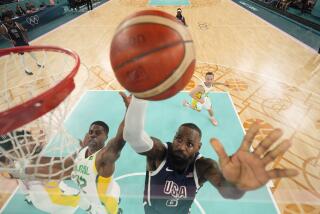WORLD CUP USA ‘94: SEMIFINALS : The Dream Teams: Italy-Brazil : Sweden Survives 25 Shots but Not Romario’s Header
The World Cup will always find its own level. It might allow upstart teams to join the party and play for a time, but it is emphatic about rejecting those it feels have lingered too long.
Sweden on Wednesday was relegated to the third-place game and thanked for its participation, as was Bulgaria. Now it’s serious, the tournament seemed to say, and it’s time for the nations dripping in soccer tradition to take center stage.
For the record:
12:00 a.m. July 15, 1994 For the Record
Los Angeles Times Friday July 15, 1994 Home Edition Sports Part C Page 9 Column 2 Sports Desk 1 inches; 22 words Type of Material: Correction
World Cup--A photo caption in Thursday’s editions misidentified the Brazil player hugging Romario after the victory over Italy. The player was Ronaldo.
That would be Brazil and Italy. Brazil toyed with Sweden before finishing it Wednesday, 1-0, before 84,569 at the Rose Bowl. Italy earlier had beaten Bulgaria. Thus the two stalwarts had rid the tournament of the teams whose hopes and aspirations had taken them further than their skill.
“A great clash of international football,” said Brazil Coach Carlos Albert Parreira, eyes dancing at the thought of meeting Italy in Sunday’s championship game. “There are two teams that are tri-champions. Finally, the world will have a four-time champion.”
Soccer traditionalists awakening this morning and noting the teams in the championship game will smile and remark to themselves that all is right with the world.
Sweden was, as always, game and determined and totally and absolutely committed to defense. Its players were athletic and undaunted and also utterly outplayed and overrun. For its part, Brazil put together its best game of the tournament and Romario, who scored the winning goal in the 81st minute, darted and slashed and repeatedly made dangerous runs.
Brazil lacked only the ability to finish--it outshot Sweden, 26-3.
Parreira’s assessment of the game might have lacked in charity but not in accuracy: “Tactically and physically we controlled the game; all aspects, all situations, all game (long). The score of 1-0 does not translate Brazil’s supremacy.”
Swedish forwards Martin Dahlin and Kennet Andersson had no forward support, but it didn’t matter as Sweden showed it had no real stomach for the attack. Even its midfield played deeply and copied the packed-back defense that had yielded a 1-1 tie when the teams played two weeks ago.
“To go through the Swedish penalty box was almost impossible,” Romario said.
It was a curious comment coming from Romario, who appeared to have little hindrance with his forays forward. Romario teamed with Bebeto and Jorginho, whose constant overlapping runs on the right side bypassed the clogged midfield. Among them, the three Brazilians peppered Swedish goalkeeper Thomas Ravelli with a fusillade of shots.
“I don’t know what the percentage was, (but) they controlled it,” Ravelli said of the ball, the game and every other significant statistic. “I think it was 70-30, or maybe even 80-20. The ball always came back whenever I shot it out.”
At one point in the first half it was not even left for Ravelli to save the day; after Romario had pulled the Swedish goalkeeper out of position, leaving a gaping net, defender Patrik Andersson raced to the rescue, kicking away Romario’s shot that appeared to be a sure goal.
It got worse for Sweden in the second half. Jonas Thern, the team’s defensive midfielder, was red-carded for a foul on Dunga. Sweden played a man down in its last game against Romania and survived, but a player down against Brazil is far worse.
Soon after that Dahlin the striker was taken out in favor of Stefan Rehn the midfielder, a defensive substitution, and Swedish Coach Tommy Svensson made known his intentions. It was the soccer equivalent of a boxer retreating to a corner and shielding his face with his gloves, content to absorb the blows.
Minutes later Romario scored. The inevitability was clear.
“They had many goal opportunities,” Svensson said. “It had to count sometimes. It was not a surprise.”
Jorginho, on the right, curved a high cross toward goal. Ravelli stood his line, noting that Romario was to his right but marked by two Swedes. The 5-foot-6 Romario leaped and knocked the ball sharply off the side of his head and into the near corner of the net, his fifth goal of the tournament.
Ravelli: “It was a hard and wicked cross.”
Ravelli knows. He knows that Brazilians can do odd and dangerous things to the ball on their crosses. They can coax a curve and dip and call the ball back to them. So Ravelli held his line, fearing a trick.
There was no trick, only Romario. Opposing goalkeepers in this tournament would argue the semantics.
Even as the Brazilian fans pounded their drums and flapped their flags, Sweden held. Its defense bent but rarely broke. Brazil had done it, it had done enough and everyone knew it would need to do no more on this day.
There was still Italy.
Brazilian assistant coach Mario Zagalo, reflecting on the win, offered this:
“There is a proverb in Brazil,” he said. “ ‘Dripping water on a hard rock keeps dripping until it wears a hole.’ There was never a time I believed Brazil was not going to do it.”
Trust in Zagalo’s judgment. He was the coach of Brazil the last time it was in the World Cup championship match, in 1970. The Brazilians played Italy. And they won.







